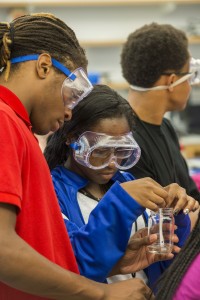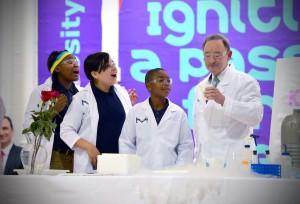
In response to the Ferguson Commission’s call to improve college access, Washington University in St. Louis has launched the College Readiness and Pipeline Initiative.
The initiative, said Chancellor Mark S. Wrighton, supports the university’s commitment to both serve the St. Louis community and to increase socio-economic diversity on campus.
“I, and many others at Washington University, have been digesting the calls to action in the Ferguson Commission report,” Wrighton said.
“Our belief is that the university’s efforts to develop a more intensive and coordinated approach to college readiness and college pipeline development in the St. Louis region will be responsive to several of the commission’s calls to action that focus on youth and generational change.”
Leading the university’s efforts will be Leah Merrifield, whom Wrighton has appointed associate vice chancellor for community engagement and St. Louis college readiness initiatives.
Merrifield, a founding board member of College Bound, leads the team that created the university’s successful College Prep Program, which prepares high-achieving students with limited financial resources for college.
In her new role, Merrifield will oversee efforts to assist local middle and high schools, community-based organizations and community colleges prepare low-income, first-generation students for college. She also will work with Undergraduate Admissions, Student Financial Services and the Office of Vice Chancellor for Students to attract more Pell-eligible students from the region.

(James Byard/WUSTL Photos)
“I am excited to expand opportunities for St. Louis area students,” Merrifield said. “Our goal is to help them get to and get through college, wherever they attend.”
Beyond the College Prep Program, Washington University is engaged in multiple initiatives to serve local students. The university serves as charter school sponsor to the three KIPP St. Louis schools and Hawthorne Leadership School for Girls, an all-girls middle school focusing on STEM education.
It also provides in-school college counseling at five local high schools through the College Advising Corp. The Institute for School Partnership provides professional development and resources to dozens of schools across the region.
The Department of Education in Arts & Sciences, the Brown School and the Gephardt Institute for Civic and Community Engagement also work in under-resourced schools to bridge gaps, mentor students and support educators.
“Over the course of the last several years, Washington University has expanded its commitment to K-12 educational opportunities for underserved populations in the St. Louis region,” said Pamela Lokken, vice chancellor for community and government relations.
“While each of our separate efforts has proven successful and has been well received, even greater success can be achieved if the university develops a more coordinated approach to address the issues of college readiness and pipeline development — for the university as well as the local college attending population.